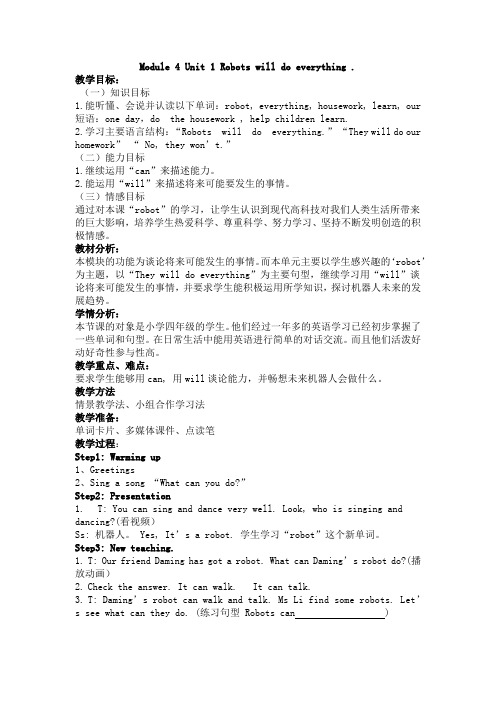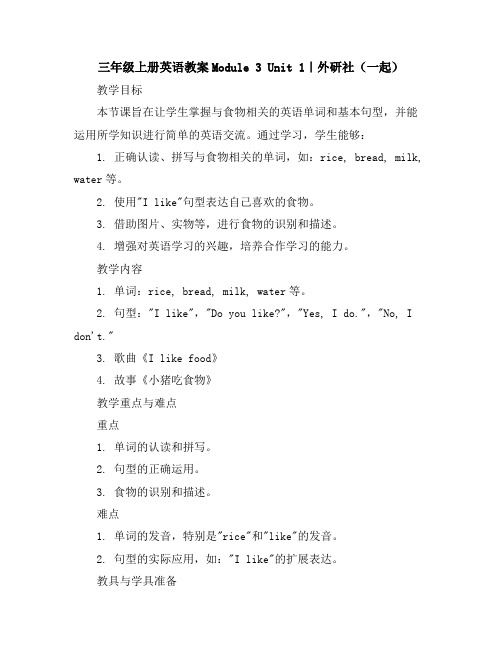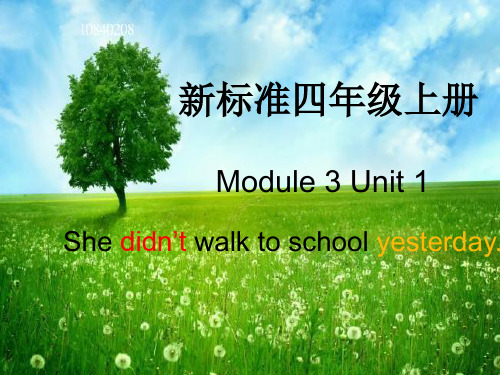外研社新标准小学英语(一起)第十册_Module3_Unit1_Have_you_got_the_H
小学英语新标准第十册Module 3 U1

500,000 Downloadable PowerPoint Templates, Animated Clip Art, Backgrounds and Videos
Read
Retell Act it out
Question Time
Why did grandma send the presents to Daming?
Daming’s Diary
Read and correct the seven mistakes.
My grandma is very kind. She loves me. She
What are they talking about? They are talking about presents.
1. What did grandma send to Daming? 2. What did Daming do with the presents?
1. What did grandma send to Daming?
lives in America. She sent me lots of presents.
She sent send a Maths game. I got get it and played
with it. And I love them. send me some it She sent
chocolates. I ate them with my family. And Mimi eat them too. Because it were delicious. And ate she sent me some English books. I readthem. it. I like them. I love my grandma very much. I’m going to send her a present for her birthday.
外研版(一起点)二年级英语上册Module3_Unit1_公开课教案

外研社2011课标版(一起)二年级上册Module 3 Unit 1 Do you like bananas? 教学设计一、教材分析本课是外研社新标准一年级起点一年级上册第三模块的第一单元。
本册教材更加注重培养学生的综合语言运用能力。
本课的课文情境是Amy邀请玲玲去家里品尝食物,并对玲玲喜欢什么食物进行询问,玲玲回答Amy的问题,最后Amy 制作出玲玲喜欢的水果奶昔。
本课的学习重点是询问他人对食物的喜好,并针对喜好进行回答。
二、学情分析本课内容对于二年级学生来说,有一定难度。
食物包括很多种,本科有水果,牛奶,奶昔等,孩子们对于这些物品比较熟悉,因此通过图片和实物结合的方法进行新授,学生更容易接受。
对于学生来说主要的难点是学生如何学习询问他人对于食物的喜好,总结出“Do you like...?”,针对这个难点,我结合情景设计出跟Amy学习的任务设置,让学生通过Amy的问题来总结出询问他人喜好的句型,学习效果更加深刻。
三、设计理念本节课我的设计理念是“以游戏为牵动的任务型教学”。
整节课的设计思路都是力求能够让学生成为语言学习的主体,给学生充分自主感知、探究的时间与机会,在本单元话题的牵动下,优化教学活动,使教学活动趣味化。
本节课我设计了猜猜看等活动来充分调动学生的积极性,注重为学生创设较真实的语言情境,培养学生“运用英语做事情”的能力。
四、教学目标1. 语言知识:全体学生能理解词汇:banana, apple, milk, orange, fruit, milkshake, Here you are.能运用词汇banana, apple, milk, here you are.全体学生能听懂并说出Do you like bananas? Yes, I do. / No, I don’t.等目标语句。
2. 语言技能:全体学生能运用“Do you like...?”询问食物;能用“Yes, I do. / No, I don’t.”说明喜好。
外研社版小学英语(一年级起点)一年级上册Module3单元测试卷

外研社版小学英语(一年级起点)一年级上册Module 3 单元测试卷Module3 Unit1 同步习题一.为下列单词选出正确的汉语意思( )1.Ms A.先生 B.女士 C.小孩( ) 2. door A.门 B.窗 C.床() 3.open A.站 B.坐 C.打开() 4. window A.下午 B.窗户 C.男孩二.单项选择题() 1. Lingling, stand,pleaseA. upB.downC.on() 2. Please the door!A. standB.openC. sit() 3.down, please.A. SitB.StandC.Point() 4.See you!A. Thank you!B. Bye!C.Good!三.给下列句子选择正确的答语(1) Lingling, stand up! A. See you!(2) Goodbye! B.Yes, Ms Smart.(3) Good afternoon. C.I' m fine.(4) How are you? D.I' m Xiaogang(5) What' s your name? E.Good afternoon.Unit2 同步习题一.连一连(1) A.door(2) B. chair(3) C.desk(4) D.window二.为下列句子选择正确的图片。
(1) Sit down!(2) Stand up, please(3) Open the door!(4) Point to the chair(5) Point to the window!三.为下列句子选择正确的翻译() 1. See you!A.再见!B.见到你很高兴( )2. Open the door!A.把门打开!B把窗户打开! () 3 Please sit down.A.请起立!B.请坐下! ( ) 4. Point to the desk!A指向椅子! B.指向书桌!。
小学英语_Module3Unit1Robotswilldoeverything教学设计学情分析教材分析课后反思

Module 4 Unit 1 Robots will do everything .教学目标:(一)知识目标1.能听懂、会说并认读以下单词:robot, everything, housework, learn, our 短语:one day,do the housework , help children learn.2.学习主要语言结构:“Robots will do everything.”“They will do our homework”“ No, they won’t.”(二)能力目标1.继续运用“can”来描述能力。
2.能运用“will”来描述将来可能要发生的事情。
(三)情感目标通过对本课“robot”的学习,让学生认识到现代高科技对我们人类生活所带来的巨大影响,培养学生热爱科学、尊重科学、努力学习、坚持不断发明创造的积极情感。
教材分析:本模块的功能为谈论将来可能发生的事情。
而本单元主要以学生感兴趣的‘robot’为主题,以“They will do everything”为主要句型,继续学习用“will”谈论将来可能发生的事情,并要求学生能积极运用所学知识,探讨机器人未来的发展趋势。
学情分析:本节课的对象是小学四年级的学生。
他们经过一年多的英语学习已经初步掌握了一些单词和句型。
在日常生活中能用英语进行简单的对话交流。
而且他们活泼好动好奇性参与性高。
教学重点、难点:要求学生能够用can, 用will谈论能力,并畅想未来机器人会做什么。
教学方法情景教学法、小组合作学习法教学准备:单词卡片、多媒体课件、点读笔教学过程:Step1: Warming up1、Greetings2、Sing a song “What can you do?”Step2: Presentation1. T: You can sing and dance very well. Look, who is singing and dancing?(看视频)Ss: 机器人。
三年级上册英语教案-Module3Unit1|外研社(一起)

三年级上册英语教案Module 3 Unit 1|外研社(一起)教学目标本节课旨在让学生掌握与食物相关的英语单词和基本句型,并能运用所学知识进行简单的英语交流。
通过学习,学生能够:1. 正确认读、拼写与食物相关的单词,如:rice, bread, milk, water等。
2. 使用"I like"句型表达自己喜欢的食物。
3. 借助图片、实物等,进行食物的识别和描述。
4. 增强对英语学习的兴趣,培养合作学习的能力。
教学内容1. 单词:rice, bread, milk, water等。
2. 句型:"I like","Do you like?","Yes, I do.","No, I don't."3. 歌曲《I like food》4. 故事《小猪吃食物》教学重点与难点重点1. 单词的认读和拼写。
2. 句型的正确运用。
3. 食物的识别和描述。
难点1. 单词的发音,特别是"rice"和"like"的发音。
2. 句型的实际应用,如:"I like"的扩展表达。
教具与学具准备1. 教具:多媒体设备、单词卡片、食物图片、歌曲《I like food》的音频、故事《小猪吃食物》的图片。
2. 学具:单词卡片、食物图片、学生手册。
教学过程第一阶段:导入1. 教师与学生进行日常对话,询问学生早餐吃了什么,引导学生用英语回答。
2. 展示食物图片,让学生说出食物的英文名称。
第二阶段:新知识学习1. 教师展示单词卡片,引导学生跟读并拼写单词。
2. 教师用句型"I like"举例,让学生模仿并表达自己喜欢的食物。
3. 学生分组练习,用" Do you like?"句型询问对方喜欢的食物,并回答。
第三阶段:游戏活动1. 教师播放歌曲《I like food》,学生跟唱。
四年级上册英语课件- Module3 Unit1 She didn’t walk to school yesterday.外研社(一起)(共17张PPT)

What does Lingling usually do ?
Lingling usually gets up at 7. She usually walks to school . She usually has English at school .
(B)1. Mary usually
to school .
to the zoo .
A . walk B. walks C. walked
(C)3. Tom watched TV and the toys .
A . plays B. play C. played
She played with her toys yesterday. She didn’t get up yesterday. She/He/I/They … ed … yesterday.
Yesterday was/were National Day!
Lingling watched TV and played with her toys .
and 连接前后一致
(B)1. Mary usually
to school .
A . walk BB. walks C. walked
(A)2. Sam didn’t
Did pig finish his homework yesterday?
No, he didn ’t.
Listen and circle didn’t .
But she didn’t get up at 7yesterday.
But she didn’t walk to school yesterday.
She/He/I/They … didn’t… yesterday.
外研版(三起)-英语-六年级上册-Module3__Unit1__第1课时教案

Module3 Unit1 第1课时教案一、教学内容外研版小学英语六年级上册第三模块第一单元第一课时:Unit 1 1. Look,listen and say. 2. Listen, read and act out.二、教学目标1. 大多数学生能够听、说、读、写单词或短语:collect, stamp, letter, hobby, collect stamps, toy, any, another。
2. 大多数学生能够听懂并运用句型: I’ve got lots of stamps. The se are stamps from Canada. This stamp is from China. Collecting stamps is my hobby.3. 能够运用所学的语言知识与同伴进行交流。
三、教学重难点重点:1. 听、说、读、写单词和短语:collect, stamp,letter,hobby,collect stamps, toy, any, another。
2. 学习句型:I’ve got lots of stamps. These are stamps from Can ada. This stamp is from China. Collecting stamps is my hobby.难点:1. 用句型“I’ve got…”及v.-ing is my hobby. 来谈论和介绍个人的爱好。
2. “have/has got+名词”表示拥有什么东西。
四、教学准备1.单词卡片。
2.同步课文动画。
3.第1课时教学课件。
4.人物大明和西蒙的头饰。
五、教学设计Step 1 Warm-up1. Have a dictation of the new words of Module2.2. Let’s sing.Let the students sing the song of Page 12 together.【设计思路】通过听写复习了前面所学到的知识,通过歌曲让学生快速地进入学习状态。
外研社新标准小学英语Book6_Module3_Unit1_She_had_eggs_and_sausages[1]
![外研社新标准小学英语Book6_Module3_Unit1_She_had_eggs_and_sausages[1]](https://img.taocdn.com/s3/m/58496d365727a5e9856a610b.png)
返回
★Homework★
♂Introduce English food to your parents.(向爸爸、妈妈介绍英国饮食)
♂Listen and repeat the dialogue for three times.(听并重述三遍短文)
★ I'm the winner!★
Who are the best? Boys and girls,you are the best !
steamed bread
English urger
sausages
fish and chips
Chinese food:
English food:
It's delicious!
It's delicious!
But it's very different.
She had eggs and sausages
Who is the best little diplomat ?
email . an email . It’s an email .
打开邮件
traditional
(传统的)
traditional Chinese food
(传统的中国食物)
Chinese Food:
rice
noodles
dumplings
1.What did she have for breakfast ?
She had eggs and sausages.
What did you have this morning?
I had two eggs and soybean milk this morning.
2.What did she have for lunch?
- 1、下载文档前请自行甄别文档内容的完整性,平台不提供额外的编辑、内容补充、找答案等附加服务。
- 2、"仅部分预览"的文档,不可在线预览部分如存在完整性等问题,可反馈申请退款(可完整预览的文档不适用该条件!)。
- 3、如文档侵犯您的权益,请联系客服反馈,我们会尽快为您处理(人工客服工作时间:9:00-18:30)。
books. C.2. How long they can have the books? D. In two weeks. E. In one week.
8
Listen and underline sentces with “have got” (划出含有have got 的句子)
What is it?
DVD
1
What is it?
librarian
2
What is it?
show
3
What is it? borrow
4
Diary (日记)
Sunday , Fine Today I went to the library with Amy.
We wanted to _b_o_r_ro_w__the Harry potter _D_V__D__s_. The _li_b_r_a_r_ia_n______is nice. ……She _s_h_o_w__e_d__the books to
5. 二.根据图片回答问题. 6. 1.----Has he got The three little pigs books?
7. Ye_s_,_h_e__h_a_s_.____________________
8. 2. ----Have you got the Wolf!Wolf! Book?
9. No__,_w_e__h_a_v_e_n__’t_.__________________
Have you got the Harry potter DVDs? Sorry , we haven’t got the DVDs. But we have got the books. You have got lots of Harry Potter books here.
16
How to borrow books in a library 借书用语
sentence. (一句一句) Act out (表演)
13
How to borrow books in a library 借书用语
Your library card, please. Here you are.
Please give the books back in two weeks. Thank you!
us.
DVDs, librarian, show, borrow5
Have they got the Harry Potter DVDS?
6
Unit 1
Module 3
Have you got the Harry Potter DVDs?
7
Listen and answer: 1. Have they got the Harry Potter DVDS?
18
Homework
3) The library has got the Harry Potter books. T F
4) Children don’t like Harry Potter in China. T F
Children like Harry Potter in China.
6) Amy hasn’t got a library card.
1.描述某人有某物的句型: 2. 主语+ have got\ has got +物品 3.2. 描述某人没有某物的句型: 4.主语+ haven’t got\ hasn’t got +物品 5.3. 询问某人是否有某物的句型: 6.---Have \ has +主语+ got +物品? 7.---Yes, 主语+have\ has. 8.---No, 主语+haven’t\ hasn’t.
Have you got the Harry potter DVDs? Sorry , we haven’t got the DVDs. But we have got the books. You have got lots of Harry Potter books here.
9
Grammar tips Have got “有”
TF
Amy has got a library card.
7) Amy should re源自urn the books in two weeks. T F
11
Listen and imitate (跟读模仿)
12
Group work:(小组合作)
Read together(齐读) Read in roles(分角色) Read one sentence by one
10
读课文,圈出T/F
Read and circle “T” or “F”.
1) Amy wants the Harry Potter DVDs. T F
2) The library has got the Harry Potter DVDs. T F
The library hasn’t got the Harry Potter DVDs.
14
Books
Snow White
Maths for Children
The Three Bears
This Is London
Ma Liang and the magic paintbrush
Wolf, Wolf!
15
Summary: DVDs, librarian, show, borrow
Your library card, please. Here you are.
Please give the books back in two weeks. Thank you!
17
一. 根据首字母或汉语提示,补全单词.
1. I’ll __s_h_o_w__(给……看)the book to you. 2. You h_a_v_e_____got the DVDs. 3. C_h_i_ld_r_e__n___in China like Harry Potter. 4. Please g_i_v_e_____the book back.
